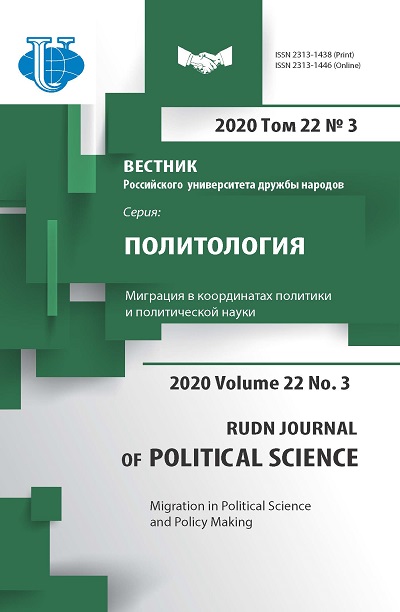Institutions and Educational and Cultural Tools of Migration Policy in Modern Russia
- Authors: Dolzhikova A.V.1, Moseykina M.N.1
-
Affiliations:
- Peoples’ Friendship University of Russia (RUDN University)
- Issue: Vol 22, No 3 (2020)
- Pages: 387-400
- Section: MIGRATION PROCESSES AND INTEGRATION OF MIGRANTS IN RUSSIA
- URL: https://journals.rudn.ru/political-science/article/view/24279
- DOI: https://doi.org/10.22363/2313-1438-2020-22-3-387-400
Cite item
Full Text
Abstract
Problem of migration and mechanisms of foreign citizens’ adaptation and integration associated with it, are in focus of public and scientific thought. Need for further institutionalization and innovative modernization of Russian migration policy is widely discussed in the framework of modern debates. Over the past few years, adaptation and integration of foreign citizens in Russian Federation has drawn public attention, as a result of rapid increase in number of foreign citizens and stateless persons permanently or temporarily residing in Russian Federation. The Concept of State Migration Policy of the Russian Federation for the Period until 2025, focuses on national security and reduction of the sociocultural, economic and political risks associated with influx of migrants. To this end, there is a quest for migration policy instruments adequate to the situation in labor market. Article analyzes already tested educational and cultural tools, defines role of resource support for participation of ethnic communities, national and cultural autonomy, educational and religious organizations, cultural and sports institutions, working on social and cultural adaptation and integration of foreign citizens.
About the authors
Angela V. Dolzhikova
Peoples’ Friendship University of Russia (RUDN University)
Author for correspondence.
Email: dolzhikova-av@rudn.ru
PhD in Chemical Sciences, Vice-Rector
6 Miklukho-Maklaya St, Moscow, 117198, Russian FederationMarina N. Moseykina
Peoples’ Friendship University of Russia (RUDN University)
Email: moseykina-mn@rudn.ru
Doctor of Historical Sciences, Professor of the Department of Russian History
6 Miklukho-Maklaya St, Moscow, 117198, Russian FederationReferences
- Chapanov A.K., Kuleshova N.S. Illegal migration and the risks of terrorism in the republic of Ingushetia. RUDN Journal of Political Science. 2017; 2: 109–117. (In Russ.).
- Dmitriev A.V. Conflict migration: a global aspect. Sociological Studies. 2004; 10: 43–65. (In Russ.).
- Vladimirova S.S., Pshenko K.A., Sharri T.G. Problems of socio-cultural, linguistic and legal adaptation of labor migrants in the Russian Federation. Man and Education. 2010; 4: 49–54 (In Russ.).
- Nam I.V. The role of national-cultural autonomies in the adaptation / integration of migrants: law and realities (on the example of Tomsk). State, Society and Church: migration and intercultural diversity: materials of a scientific and practical conference with international participation, Novosibirsk, May 29–30, 2018: in 2 parts. Part 2. Novosibirsk: SibAGS; 2018: 104–110 (In Russ.).
- Integration Examination for Foreign Citizens: Foreign Experience, Problems and Examination Prospects in Russia / Dolzhikova A.V., Kozmenko V.M., Moseykina M.N. Moscow: RUDN; 2017.
- Kozmenko V.M. Complex examination for foreign citizens in Russian language and history and fundamentals of RF legislation as an important factor of their social and cultural adaptation. RUDN Journal of Russian History. 2014; 3: 138–146 (In Russ.).
- Dolzhikova A.V., Kiseleva E.V. Integration Examination for Migrants in Russia: Legal Regulation and Methodical Provision. Annales. Series historia et sociologia. Slovenia. 2015; 1 (25): 369–376.
- The concept of the exam in the Russian language, the history of Russia and the basics of the legislation of the Russian Federation for migrant workers – various categories of citizens of the CIS, Baltic countries and abroad. Russian Test: Theory and Practice. 2014; 1: 48–64 (In Russ.).
- Tryapelnikov Anatoly V., Pomortseva Natalia V., Sinyachkin Vladimir P. The concept of organizing the language training of foreign citizens for the comprehensive exam on the Russian language, the history of Russia and the basics of the legislation of the Russian Federation using remote technologies. Higher Education Today. 2015; 12: 75–80. (In Russ.).
















